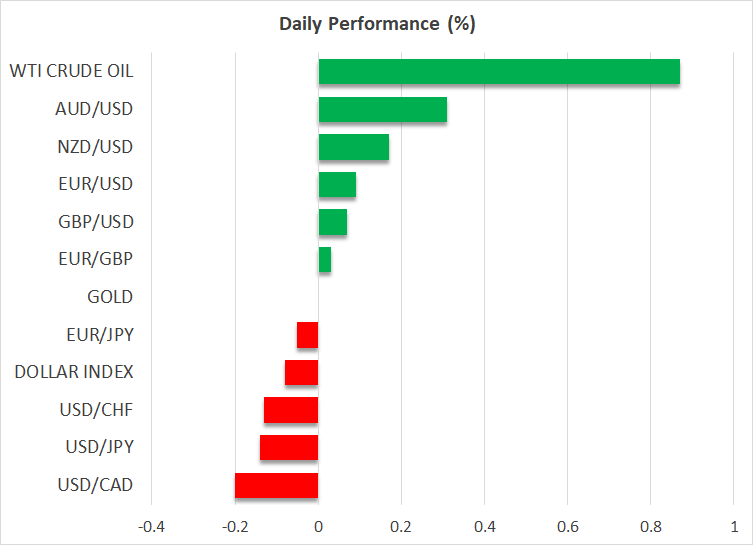Biden and McCarthy Agree to Raise U.S. Debt Ceiling
2023.05.29 05:39
- Biden and McCarthy find common ground, deal ready for Congress vote
- Dollar takes a breather, but summer hike bets increase
- Turkish lira slips to new record low as Erdogan secures victory
- Wall Street gains, mainly driven by chip stocks

Biden and McCarthy agree to suspend debt ceiling until 2025
The dollar traded lower against most of the other major currencies on Friday, and continued its retreat today, even as US President Biden and Congressional Republican McCarthy reached common ground over the weekend to avert a government default, by agreeing to suspend the $31.4tn debt ceiling until 2025.
Now, the two leaders need to convince both chambers of Congress to accept the accord, with Republicans controlling the House and Democrats holding a majority in the Senate. They must pass the deal before June 5, as this is the date when the US will no longer be able to pay its bills according to Treasury Secretary Yellen.
Although the dollar took a breather on Friday and early today, the weekend consensus is nothing but a positive development as it diminishes concerns about economic instability and thereby allows investors to add to bets regarding a summer hike by the Fed. According to Fed funds futures, they are now assigning a 63% probability for a quarter-point hike in June and they are almost certain that a hike will be delivered by July.
Dollar may continue to benefit, but reversal call remains premature
The dramatic change in market pricing came after investors started paying attention to hawkish rhetoric by Fed officials, with some favoring a June hike, others hinting at a pause but with the prospect of another hike later, and others preferring to rely solely on incoming data. Nonetheless, all of them agree that it is too early to start discussing interest rate cuts. That’s why the market went from pricing in more than three quarter-point cuts for this year a couple of weeks ago to pricing in only one.
The dollar could continue outperforming most of its major peers for a while longer, especially if this week’s jobs data come in strong and allow traders to scale back more basis points worth of cuts. However, arguing about a full-scale bullish reversal is still premature. With such a dramatic repricing of Fed expectations, the (DXY) gained less than 4%, and with only 25bps worth of cuts left to be priced out for this year, any additional gains due to that may be limited.
For the greenback to extend its recovery and head for a bullish reversal, Fed officials may need to also start pouring cold water on expectations of rate reductions for early next year. Something like that may allow the dollar index to slowly climb above the 105.50 area, a move that could signal the completion of a ‘double bottom’ reversal formation on the daily chart.
Elsewhere, the Turkish lira slipped to a new record low as President Tayyip Erdogan secured victory in Sunday’s presidential election. With Erdogan being an advocate of the unorthodox economic theory that cutting interest rates will lead to lower inflation, the local currency may be destined to extend its free fall to new lows.
Chipmakers drive Wall Street higher
Wall Street traded in the green on Friday, with all three of its main indices gaining 1% or more. That may have been due to the headlines suggesting progress in the debt-ceiling talks ahead of the weekend deal. The tech-heavy Nasdaq was the main gainer, as chip stocks surged for a second day on optimism about artificial intelligence (AI). Marvell (NASDAQ:) Technology Inc surged more than 30% after it estimated that its annual AI revenue would double, while Nvidia (NASDAQ:) Corp added another 2.54% after skyrocketing almost 25% on Thursday due to stellar forecasts.
Having said all that though, with the Nasdaq adding more than 37% since its October bottom, the risks of a potential correction soon are likely increasing, especially with investors raising their implied Fed rate path. Expectations of higher interest rates mean higher borrowing costs for firms, and lower present values.
What’s more, a debt-ceiling deal could be positive in the very short run as it dismisses the risk of a destabilizing economy due to a shutdown, but a potential liquidity squeeze from Treasury issuance to bolster cash could result in higher yields and perhaps hurt equities.









